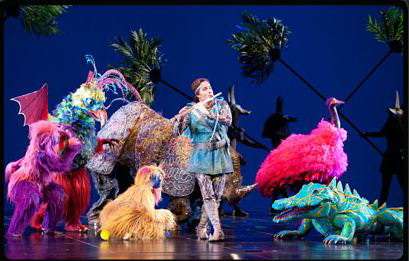|
Back
The Magic Flute Changes the Way You Feel Seattle
McCaw Hall
05/07/2011 - & May 8, 11, 14, 15*, 18, 20, 21, 2011
Wolfgang Amadeus Mozart: Die Zauberflöte, K. 620
Jonathan Boyd (Tamino), Hanan Alattar (Pamina), Mari Moriya (Queen of the Night), Keith Miller (Sarastro), Leigh Melrose (Papageno), Doug Jones (Monostatos), Philip Skinner (The Speaker), Anya Matanovic, Marcy Stonikas, Lindsey Anderson (Three Ladies), Ani Maldjian (Papagena)
The Seattle Opera Orchestra, Gary Thor Wedow (Conductor)
Chris Alexander (Stage Director), Robert Dahlstrom and Robert Schaub (Set Designers), Zandra Rhodes (Costume Designer), Duane Schuler (Lighting Designer)

J. Tessier (© Rozarii Lynch/Courtesy of SO)
From Sarastro’s low F growled by Keith Miller to the Queen of the Night’s (Mari Moriya) stunning high F, this beloved and often performed The Magic Flute’s four-octave range stretches for far more than notes.
Chris Alexander’s brilliant and technicolor production at the Seattle Opera through May 21 is both a fairytale of a rhinestone-studded rhinoceros dancing with a dainty shocking-pink flamingo and a classic tale of lovers finding their way through dark and light. Wolfgang Amadeus Mozart’s last opera, staged in 1791, the same year as the composer’s death at 35, continues to resonate with fantasy and humanity.
The magic flute, Tamino’s secret “weapon,” changes the way people feel, he’s told as he begins his journey to find Pamina. And Mozart for us – especially in this 2 and 1/2-hour production – changes the way we feel. It’s a new take on the “Mozart Effect,” dizzyingly fun and beautiful.
The stellar and deceptively challenging singing (who doesn’t anticipate the Queen of the Night’s “O zitt’re nicht, mein lieber Sohn!” aria, hoping her notes will touch the starry heavens?) shows how well this company cultivates talent. Several of the minor roles are sung by former Seattle Opera Young Artists.
Because the two acts are long and the scenes are many, the pyramid scenery, which changes colors through LED lighting, creates an ideal backbone for the multiple stage changes. Mozart, a dedicated and forward-thinking Mason, was intrigued by ancient Egypt and his “singspiel” (partly spoken/partly sung piece, popular in 18th-century German comic theater) has numerous Egyptian details, making the melodic Western music a pleasing foil to the exotic details.
The Seattle Opera has two casts for its long and demanding shows. This time, to save singers’ voices, the performers were miked for the speaking parts, but not for the singing, of course. The McCaw Hall, as fabulous as its acoustics are, was not designed for non-miked speaking.
Zandra Rhodes’ costumes were as fanciful as Pagageno’s birds that flew across the stage with some inventive aerial work. And Gary Thor Wedow’s conducting was sensitive and subtle. His touch was light and silvery, not too much, not too little. Both pros were making their debut with the Seattle Opera.
Throw in several well-coach children (the Three Spirits), as well as a bundle of mini Papagenos and Papagenas and this charming opera brings out the kid in all of us.
Angela Allen
|